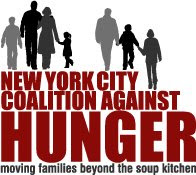Advocates are currently allowed to enter food stamps offices with the express purpose of helping individual clients they have contacted before their appointment date. Prior to 1995, benefits advocates were allowed to distribute literature and offer assistance within HRA waiting rooms, but a 1995 executive order by then-Mayor Guiliani ended the practice. The order was upheld after a court decision stated that HRA offices were not “public space.” The HRA Commissioner was thus given the authority to restrict access to benefits offices, and has continued to do so since.
But, as the number of benefits applicants rises and complaints against HRA continue, Gotbaum and City Councilmembers Bill de Blasio and Eric Gioia are attempting to reinstate waiting room advocacy. The Ready Access to Assistance Act (REAACT) seeks to overturn the early court ruling and allow for advocates to offer assistance, including translation services, upon request at HRA offices. “These help desks work, and they work well,” says Gotbaum. “My bill authorizes agencies to make rules to implement help desks and if agencies have concerns about supervision of advocates, simple steps can be taken to address these concerns.
The act has gained the support of a veto-proof majority in City Council, but Speaker Christine Quinn has remained indefinite on whether she will support a hearing on the bill. Quinn has echoed the HRA’s complaint that the policy would add to the confusion already characteristic of food stamp application offices and could undermine the authority of HRA staff.
Advocates argue that the disagreement underscores a fundamental difference in view on the role of benefits offices, claiming that HRA continues to uphold the Guiliani view, prioritizing “slashing the roles” rather than helping clients get the food they need and the benefits to which they are entitled.
It remains to be seen whether REAACT can help bridge this difference. HRA staff and food stamp advocates have a long way to go when it comes to fostering a collaborative, rather than oppositional, relationship. In the interim, more clients need to be connected with the information necessary to help them get the benefits they need. Nowhere is this process more fraught with problems than within food stamp offices. Allowing advocates in benefits offices would prioritize the autonomy of clients over the autonomy of HRA: a welcome change to a system that otherwise leaves very little room for client choice.

No comments:
Post a Comment